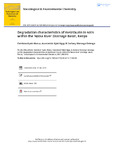Degradation characteristics of metribuzin in soils within the Nzoia River Drainage Basin, Kenya

View/
Date
2016Author
Mutua, Gershom Kyalo
Ngigi, Anastasiah Njoki
Getenga, Zachary
Metadata
Show full item recordAbstract
Metribuzin, a triazinone herbicide, is heavily used within the
expansive Nzoia River Drainage Basin in Kenya for the optimization
of sugarcane yields. For field experiments, soils were spiked with
metribuzin and amended with filter mud compost and Tithonia
diversifolia leaves. Soils with history of metribuzin application (48
months) were also spiked with metribuzin but not amended with
the organic materials. Degradation of metribuzin for the three
variants was followed for a period of 102 days. Repeated exposure
of metribuzin to soil and addition of filter mud compost to soil
enhances the degradation of metribuzin with half dissipation times
of 31 and 25 days. In soil amended with Tithonia diversfolia leaves,
the half dissipation time was 32 days while in the control
(unamended non history soil), it was 36 days. Laboratory studies
showed that soil sterilization slowed the degradation of metribuzin,
with a half dissipation time of 154 days. This confirmed that
metribuzin was biochemically degraded in soil by an adapted
community of microbes.
